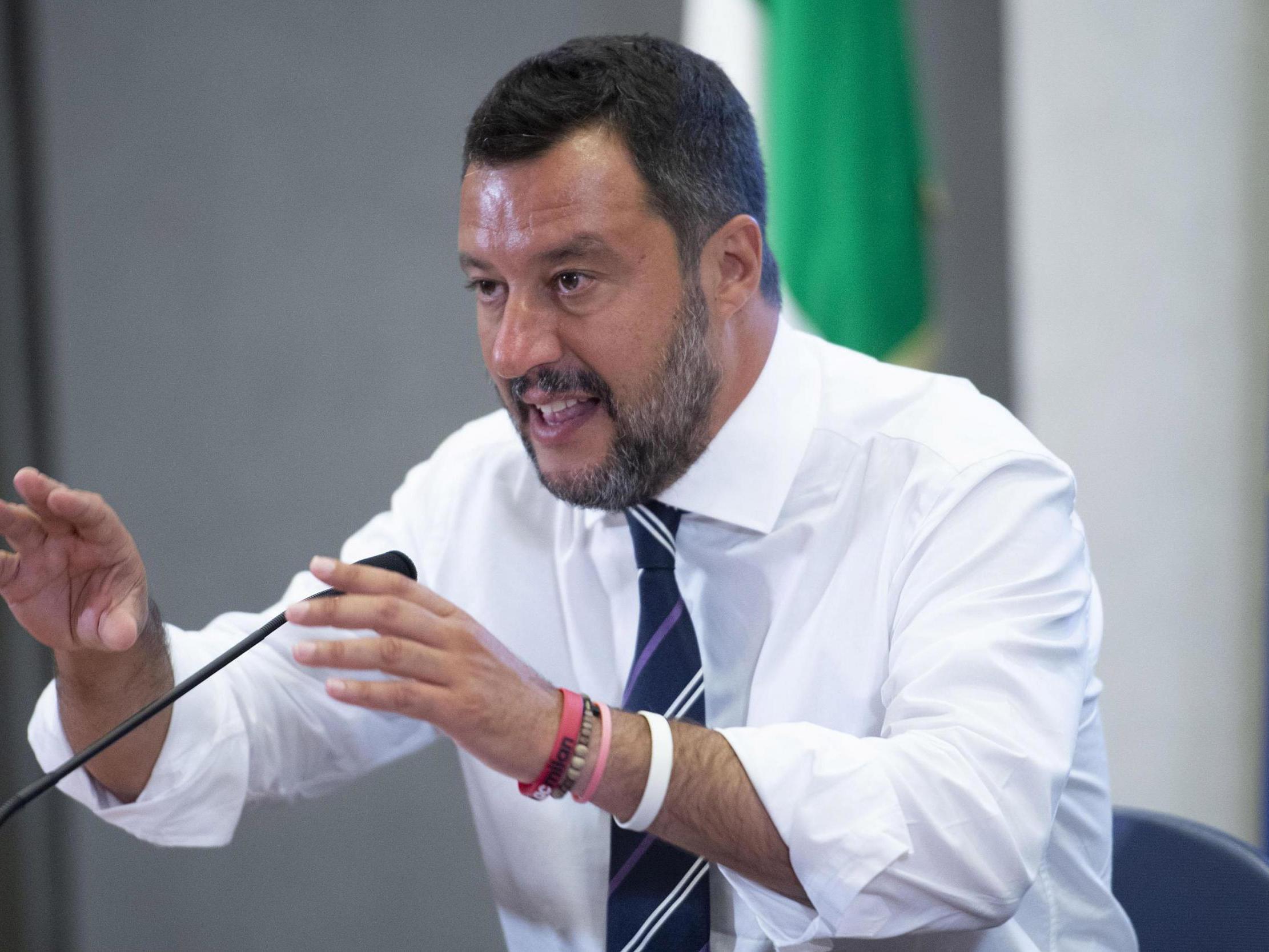Salvini calls for new election as Italy’s coalition government falls apart
The far-right Lega party leader announced he will run for prime minister at a rally

Your support helps us to tell the story
From reproductive rights to climate change to Big Tech, The Independent is on the ground when the story is developing. Whether it's investigating the financials of Elon Musk's pro-Trump PAC or producing our latest documentary, 'The A Word', which shines a light on the American women fighting for reproductive rights, we know how important it is to parse out the facts from the messaging.
At such a critical moment in US history, we need reporters on the ground. Your donation allows us to keep sending journalists to speak to both sides of the story.
The Independent is trusted by Americans across the entire political spectrum. And unlike many other quality news outlets, we choose not to lock Americans out of our reporting and analysis with paywalls. We believe quality journalism should be available to everyone, paid for by those who can afford it.
Your support makes all the difference.Italy’s far-right interior minister Matteo Salvini has called for new elections after he declared that the current government coalition had fallen apart.
“I will run for prime minister,” Mr Salvini told supporters in the central Italian city of Pescara on Thursday night during a rally, part of his “Italian Summer Tour”, featuring appearances at beaches and other tourist destinations.
“Let’s go straight to parliament and acknowledge there is no longer a majority […] and quickly go back to voters,” he said.
Salvini’s far-right Lega Party has been in government in a coalition with the anti-establishment Five Star Movement since June 2018, with the technocrat Giuseppe Conte as prime minister.
Mr Conte confirmed in a press conference that Mr Salvini expressed “the will to go back to the polls to capitalise on his party’s current approval ratings”.
But it’s not up to him to “dictate the tempo of the political crisis”, he added.
The announcement sent Milan’s stock market plummeting by 2.3 per cent on Friday morning, but it is unclear if and when Italy will hold new elections.
Mr Conte signalled on Thursday he will not resign for now.
But on Friday, the Lega party said in a statement that it will present a motion of no confidence in the Senate to bring down the government, hoping the country could quickly proceed to snap elections.
“Those who waste time hurt the country,” the party said in the statement.
Parliament has closed for the summer recess and it is up to the president of the Senate to decide when to recall it.
The Italian president Sergio Mattarella is the ultimate arbiter of the country’s politics and the only authority who can dissolve the parliament and call the elections.
If the government falls after a vote of no confidence, Mr Mattarella can still gauge if parliament can produce a new coalition government without heading to the polls.
Professor Daniele Albertazzi, a political scientist who specialises in European populism at the University of Birmingham, told The Independent that it’s still far from certain that Italy will, in fact, hold elections soon.
“Mattarella will do anything he can to push elections back until the spring to give the country some stability,” he said.
He added that other parties would be “suicidal” to agree to go to the polls in October at the peak of Salvini’s popularity and might form a new, temporary government coalition.
Mr Salvini said the reasons for the fracture were that the two ruling parties had different views on infrastructure and that he has come under increasing criticism by coalition MPs for an inquiry into alleged Russian funding funnelled into the Lega party.
“We can’t continue to deal with nos and arguments as in the latest weeks,” Mr Salvini told supporters in Pescara on Thursday.
In recent weeks, the Five Star Movement and Lega clashed over the building of a high-speed railway connecting Turin, in the northwest, with Lyon, France.
But Prof Albertazzi believes that to be a pretext, as the Five Star Movement has campaigned against the project for years and it was clear it would oppose it.
“Salvini must have realised that the 38 per cent support he enjoys now isn’t sustainable,” he says.
The professor says Mr Salvini would lose support because he would have to start to deliver on more expensive and less realistic promises made by the populist government coalition, such as cutting taxes and boosting public spending without landing the country in trouble.
Speaking to Italy’s national broadcaster Rai, the head of the Five Star Movement, 33-year-old Luigi Di Maio, accused Mr Salvini of putting party interests above national interest.
But while he said his party is ready for a potential new election, some observers see the two parties’ reversed fortunes as the real reason for the crisis.
The Five Star Movement was the big winner of the 2018 elections with almost 33 per cent of the votes but now polls pin them at about 17 per cent, according to recent surveys.
On the other hand, Salvini’s Lega had 17 per cent last year but now boasts about 38 per cent – a sign that investigations into Russian funding haven’t harmed Salvini’s ratings.
The centre-left Democratic Party is polling at about 23 per cent.
If the country does head to new polls in the coming months, the current parliamentary term would become the shortest in Italian republican history. The new government would be Italy’s 66th government in 74 years as a democracy.
Additional reporting by Reuters
Join our commenting forum
Join thought-provoking conversations, follow other Independent readers and see their replies
Comments